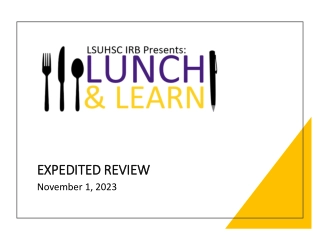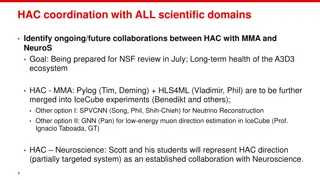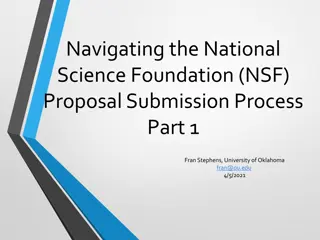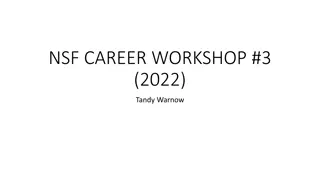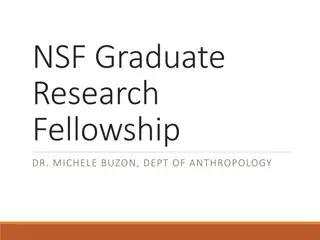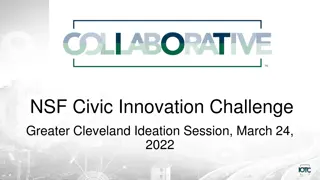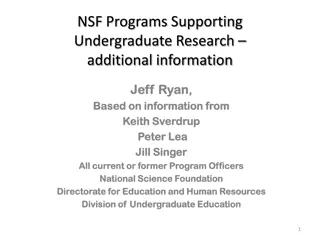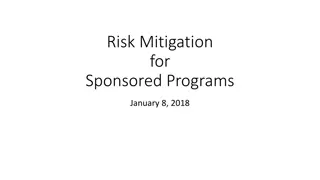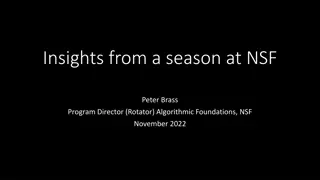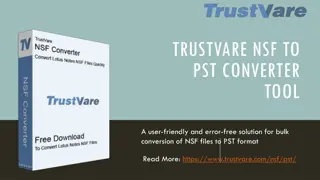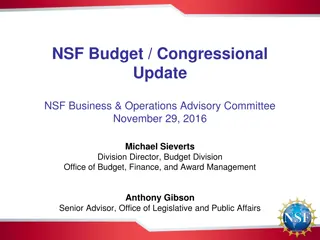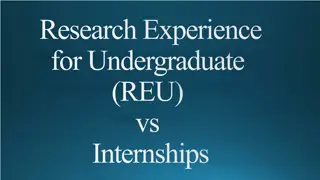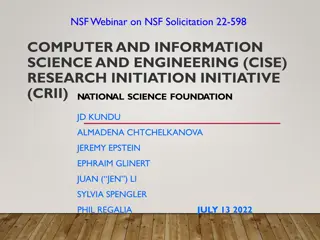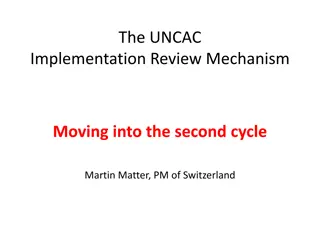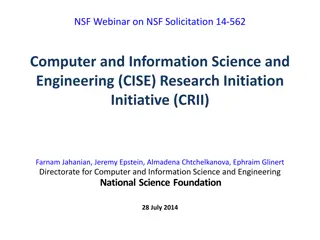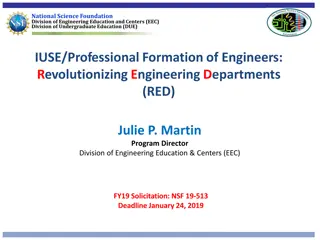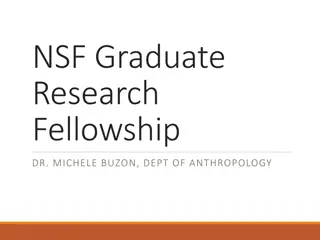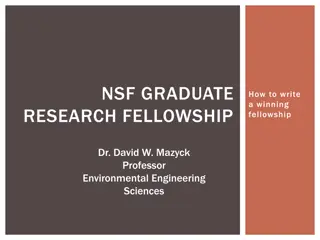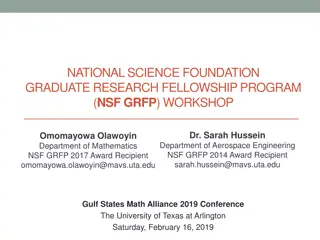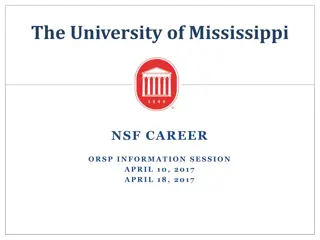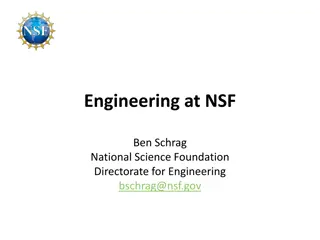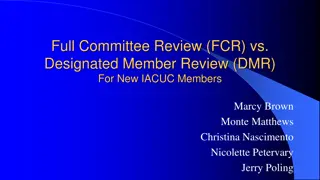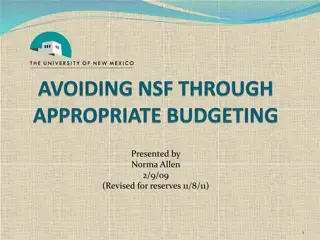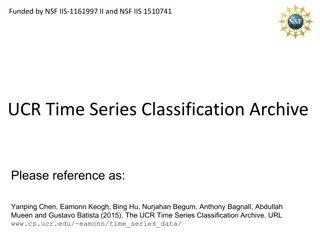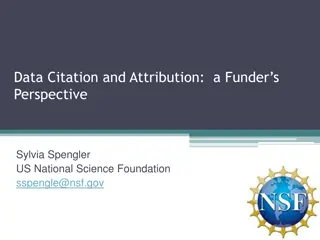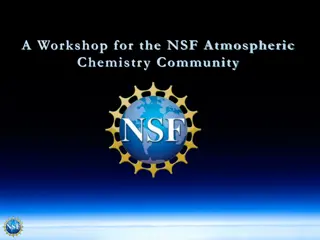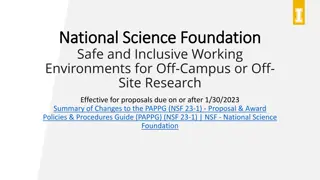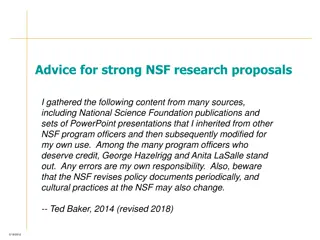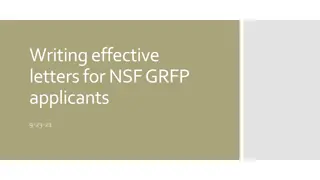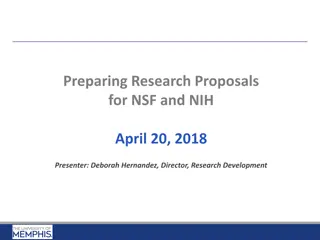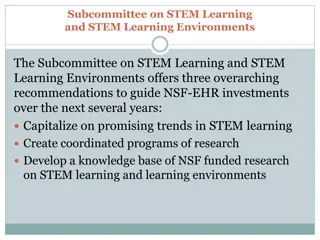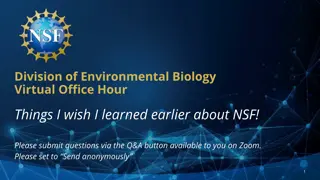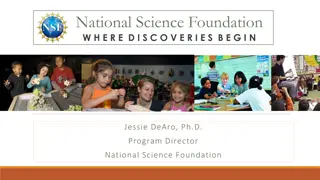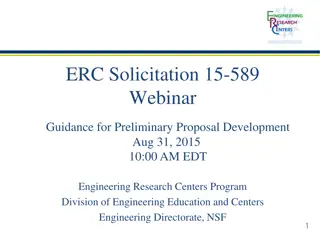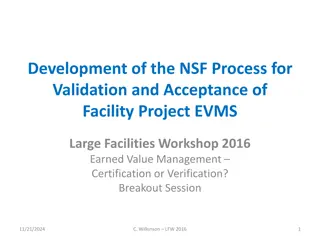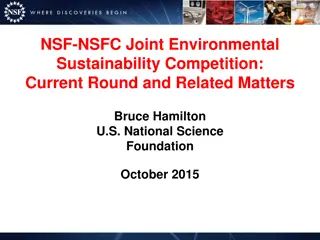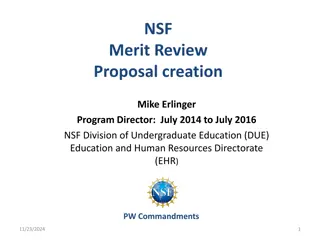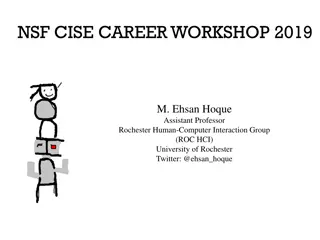Understanding IRB Review Process for Expedited Research
Learn about the significance of IRB review, levels of review, and categories of expedited review. Discover the criteria for IRB review, including whether the study involves human subjects and contributes to generalizable knowledge. Explore the different levels of IRB review and the specific categori
4 views • 11 slides
Ongoing Collaborations in Scientific Domains for NSF Review Preparedness
Ongoing and future collaborations between the High-Performance Algorithm-System-Hardware Co-Design (HAC) team with Machine Learning and Analytics (MMA) and Neuroscience areas are outlined. Collaborations include merging Pylog and HLS4ML into IceCube experiments, utilizing SPVCNN and GNN for neutrino
2 views • 4 slides
Navigating NSF Proposal Submission Process
This guide provides an overview of the National Science Foundation (NSF) Proposal Submission Process, including background information, proposal contents format guidance, common requirements, post-submission actions, and more. Learn about NSF's mission, goals, leadership structure, directorates, sup
1 views • 26 slides
Guidelines for NSF CAREER Proposal Process
Brief overview of the NSF CAREER Workshop #3 led by Tandy Warnow, including information on the Project Description, integrating research and education, and the education component of the proposal. Successful applicants will propose creative and effective plans that align with their career goals whil
0 views • 25 slides
NSF Graduate Research Fellowship - Application and Review Process
The NSF Graduate Research Fellowship program offers financial support for US citizens, nationals, or permanent residents pursuing graduate studies. Applicants must adhere to specific guidelines for eligibility and submission, including personal statements, research plans, recommendation letters, and
1 views • 4 slides
NSF Civic Innovation Challenge - Empowering Community-driven Solutions in Greater Cleveland
The NSF Civic Innovation Challenge is a unique opportunity for community partners and researchers to collaborate on addressing pressing community challenges. The challenge, organized into two tracks, focuses on climate resilience and essential resources for communities. Learn more about this researc
1 views • 9 slides
NSF Career Workshop 2023: Tips and Deadlines
Overview of NSF CAREER proposal process, including eligibility criteria, important messages, and submission deadlines. Tips from experts on letters, budget, and document preparation. Emphasis on starting early, careful planning, and revision process. Highlighted deadlines and recommendations for suc
0 views • 26 slides
NSF Programs Supporting Undergraduate Research Overview
Explore various NSF programs supporting undergraduate research and education, including opportunities such as Research in Undergraduate Institutions (RUI) and Research Opportunity Awards (ROA) aimed at leveling the playing field and fostering future generations of researchers. Learn how these initia
1 views • 19 slides
Post Award Reporting Guidelines for NSF Directorate CISE Awardees
Guidelines for NSF Directorate CISE awardees on post-award responsibilities, including communication with program directors, annual and final project reports, and consequences of late reporting. Details include reporting types, deadlines, and necessary communication protocols to ensure smooth projec
0 views • 9 slides
Mitigating Risks in Sponsored Programs - Audit Trends and Common Themes
The article discusses risk mitigation in sponsored programs, focusing on audit trends and common themes identified in recent NSF reports. The audits revealed questioned costs totaling over $860,000, highlighting issues such as travel costs, pre-award expenses, and inadequate documentation. Furthermo
0 views • 7 slides
Insights from a Season at NSF: Program Director's Perspective
An experienced Program Director at NSF shares personal insights and experiences working within the Algorithmic Foundations group, overseeing programs in areas like robotics and scalable systems. The role of a Program Director, the structure of NSF, and the funding mechanisms for basic research are d
0 views • 25 slides
Convert HCL Notes NSF Files to Outlook PST Format With TrustVare Software
You can convert HCL Notes NSF files to Outlook PST format with TrustVare Software without a single error. This is one of the best solutions for technical and non-technical users to convert bulk emails from NSF to PST files without a single error. Thi
6 views • 9 slides
NSF Budget Updates and Funding Overview
Explore the latest NSF budget updates from Congressional meetings, funding comparisons for FY 2017, and insights on mandatory funding in federal spending. The provided images and data showcase NSF's financial figures and requests, along with explanations on discretionary and mandatory allocations.
0 views • 12 slides
Understanding Research Experiences for Undergraduates (REU) vs Internships
Research Experiences for Undergrads (REU) funded by the National Science Foundation (NSF) offer unique opportunities for students in the USA. These programs provide hands-on research experience, the chance for publication, exposure to diverse fields, and valuable skills for career progression. NSF f
0 views • 12 slides
NSF CRII Research Initiation Initiative Overview
The NSF CRII program aims to support early-career faculty in computer and information science and engineering by fostering research independence. Eligible applicants should be untenured and within the first three years of a tenure-track or equivalent position. The program focuses on encouraging expl
0 views • 20 slides
UNCAC Implementation Review Mechanism: Moving Towards the Second Cycle
The UNCAC Implementation Review Mechanism is progressing into its second cycle, with a focus on evaluating challenges and terms of reference at the conclusion of each review cycle. The performance assessment has highlighted achievements in enhancing awareness and involvement of civil society/private
0 views • 7 slides
NSF CISE Research Initiation Initiative (CRII) Webinar Summary
The NSF CISE Research Initiation Initiative (CRII) Webinar on Solicitation 14-562 for Computer and Information Science and Engineering provides details on program goals, eligibility criteria, areas of interest, submission and review processes, frequently asked questions, and program director contact
0 views • 20 slides
Revolutionizing Engineering Departments: NSF's RED Initiative
NSF's Division of Engineering Education and Centers (EEC) aims to revolutionize engineering education by focusing on the middle two years of undergraduate curricula. The RED initiative emphasizes revolutionary changes in engineering departments to address complex 21st-century societal challenges. Th
0 views • 24 slides
NSF Graduate Research Fellowship - Dr. Michele Buzon, Department of Anthropology
The NSF Graduate Research Fellowship, overseen by Dr. Michele Buzon from the Department of Anthropology, offers a stipend of approximately $34,000 along with $12,000 for the institution. The fellowship is open to U.S. citizens, nationals, and permanent residents. Eligibility criteria include having
0 views • 4 slides
Writing a Winning Research Fellowship Proposal: Tips from NSF Graduate
Learn valuable insights on crafting a successful fellowship proposal for research funding from the renowned Dr. David W. Mazyck, a Professor of Environmental Engineering Sciences. Discover why applying for the NSF Research Fellowship is beneficial, key strategies to stand out during the review proce
0 views • 22 slides
NSF GRFP: A Comprehensive Guide to the National Science Foundation Graduate Research Fellowship Program
The National Science Foundation Graduate Research Fellowship Program (NSF GRFP) is a prestigious award supporting early career individuals in STEM fields. This post covers the award description, myths, application process, and important dates for eligibility and preparation. Learn about the benefits
0 views • 14 slides
NSF CAREER Development Program Overview at University of Mississippi
Information session held at the University of Mississippi regarding the NSF CAREER program, focusing on eligibility, goals, and opportunities for early-career faculty members to integrate research and education. The session included introductions of panelists, an overview of the NSF Faculty Early Ca
0 views • 23 slides
National Science Foundation Directorate for Engineering Overview
The National Science Foundation (NSF) Directorate for Engineering (ENG) provides funding opportunities for innovative research in various engineering disciplines. The organization's mission is to advance engineering research, innovation, and education to benefit society and the nation. ENG offers co
0 views • 64 slides
Understanding Full Committee Review (FCR) vs. Designated Member Review (DMR) for New IACUC Members
Explore the differences between Full Committee Review (FCR) and Designated Member Review (DMR) for new IACUC members. Learn the acceptable methods of protocol review, federal requirements, member responsibilities, risks, and best practices for protocol approval. Dive into the two valid methods of IA
1 views • 23 slides
Understanding NSF Rejections in Banner System
Explore the impact of NSF rejections on different levels of organizations and funds within the Banner system. Learn how Banner calculates NSF, which transactions are subject to NSF, and how to identify NSF status. Discover tools like Hyperion Report FOH0003 to assist in managing NSF issues effective
0 views • 45 slides
UCR Time Series Classification Archive Overview
The UCR Time Series Classification Archive, funded by NSF IIS-1161997 II and NSF IIS-1510741, provides valuable resources for researchers interested in time series data analysis. The archive contains datasets in TRAIN and TEST partitions, with data instances stored in ASCII format. Researchers can u
0 views • 14 slides
Funders Perspective on Data Citation and Attribution
Explore the perspectives of Sylvia Spengler from the US National Science Foundation on the importance of data citation and attribution. Learn about the impact measures, promotion of interdisciplinary science, and career development mechanisms endorsed by NSF. Understand the significance of attributi
0 views • 7 slides
NSF Atmospheric Chemistry Program Overview
The NSF Atmospheric Chemistry Program aims to characterize the chemical composition of the atmosphere, understand chemical processes, quantify fluxes of chemical substances, study natural and anthropogenic causes of variability, and assess impacts on climate. The program supports research through pe
0 views • 6 slides
NSF Policy Update: Safe and Inclusive Research Environments for Off-Site Projects
NSF has updated its policy to ensure safe and harassment-free working environments for off-campus research projects. Organizations must now provide a per-proposal plan addressing behaviors like abuse, harassment, and unwelcome conduct. The policy expands on NSF's 2018 stance on sexual harassment and
0 views • 17 slides
Expert Advice for Building Strong NSF Research Proposals
Gain valuable insights from experienced NSF program officers George Hazelrigg and Anita LaSalle on writing successful research proposals. Learn key strategies, avoid common mistakes, and understand the NSF review process to increase your chances of securing funding for your research projects.
0 views • 123 slides
Guidelines for NSF GRFP Reference Letters Submission
Discover key instructions for submitting reference letters efficiently for the NSF Graduate Research Fellowship Program (GRFP). Learn about the requirements, deadlines, and detailed guidelines for reference writers and applicants to ensure a successful application process.
0 views • 18 slides
Mastering NSF and NIH Research Proposals
Gain insights into crafting research proposals for NSF and NIH, covering proposal evaluation, required documents, and programmatic structures of these major funding agencies. Understand the criteria, review process, and key components of NSF proposals.
0 views • 14 slides
Recommendations for Advancing STEM Education
The Subcommittee on STEM Learning and STEM Learning Environments provided three key recommendations for guiding NSF-EHR investments in the coming years. These recommendations include capitalizing on emerging trends in STEM learning, developing coordinated research programs, and creating a knowledge
0 views • 7 slides
Important Updates and Opportunities in Environmental Biology from NSF
Discover key information about upcoming events, funding opportunities, and ways to engage with the Division of Environmental Biology (DEB) at NSF. Stay informed on virtual office hours, blog posts, news updates, and recent funding opportunities to enhance your participation in conservation science a
0 views • 14 slides
National Science Foundation - Where Discoveries Begin
The National Science Foundation (NSF) is dedicated to promoting science progress, advancing national health, prosperity, and defense. Under the direction of Program Director Jessie DeAro, Ph.D., NSF offers various funding opportunities and resources for researchers and grantees to support their work
0 views • 21 slides
NSF Engineering Research Centers Webinar Aug 31, 2015
The NSF Engineering Research Centers (ERC) program offers guidance for developing preliminary proposals, focusing on new features, fundamental questions, review criteria, and budget details for potential center proposals. Key topics include leadership, workforce development, infrastructure, innovati
0 views • 74 slides
Development of NSF Process for Validation and Acceptance of EVMS: Insights and Recommendations
NSF is enhancing guidelines for Earned Value Management Systems (EVMS) to evaluate construction project status. Insights suggest obtaining certification and validation for maintaining acceptable EVM systems, important for project oversight. Recommendations highlight the need for decisive action to e
0 views • 16 slides
Opportunities in Environmental Sustainability Competitions
The NSF-NSFC Joint Environmental Sustainability Competition focuses on topics like combustion related to sustainable energy and urban water sustainability. The current round includes deadlines and grant details. Additionally, NSF is involved in various related programs and has announced new Sustaina
0 views • 12 slides
Understanding Merit Review Process at NSF for STEM Education
This presentation provides valuable insights into the Merit Review Process at NSF, focusing on STEM education initiatives. It covers key guidelines, criteria for proposal evaluation, important resources, and the overall review process. The content emphasizes the importance of intellectual merit and
0 views • 69 slides
Insights into the NSF CAREER Application Process
Delve into the experiences of M. Ehsan Hoque, an Assistant Professor specializing in the intersection of AI and HCI, as he shares his journey applying for the NSF CAREER grant. Learn about his submission history, grant writing experiences, successful and unsuccessful cases, grant reviews, and sample
0 views • 12 slides
